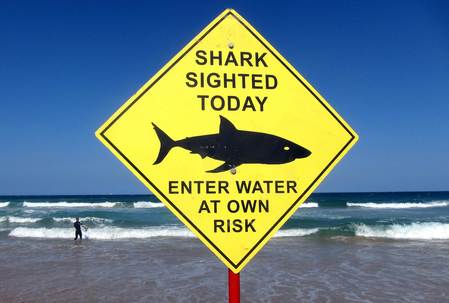Advertisement
Suspected shark attacks in Florida, California over holiday weekend

By Barbara Goldberg
(Reuters) – Two people were injured in suspected shark attacks in Florida and California over the U.S. Memorial Day holiday weekend, but beachgoers returned to nearby ocean waters on Monday, officials said.
On Sunday, a 13-year-old boy was bitten on the right leg in Neptune, Florida, east of Jacksonville, and a woman in Newport Beach, California, was bitten on her torso and arms, according to police and local media reports.
“Even though we can’t confirm it was a shark attack, we’re treating it as a shark attack,” Newport Beach Fire Department Lifeguard Battalion Chief Michael Halphide said of the California attack.
“I don’t think there’s a whole lot of doubt that these will be considered unprovoked shark attacks,” said George Burgess, a shark expert at the University of Florida. “These are entirely predictable things just as you can predict drownings or car accidents as a result of this being a huge holiday weekend.”
Officials closed a 5-mile (8-km) stretch of beach in Newport Beach on Sunday but reopened a 2-mile (3-km) piece on Monday as lifeguard patrol boats and police helicopters searched for sharks, Halphide said. If any are is found, they will be observed but not caught or killed, he said.
Still closed on Monday was Corona del Mar State Beach, located in Newport Beach, where the incident occurred, as well as some adjacent coastline.
“We expect good crowds, probably more than 75,000 people this holiday,” Halphide said.
In Florida, Neptune Beach remained open the day after the 13-year-old was attacked just before 3 p.m. by what was described as a 5-foot shark, police said.
Cell phone video on NBC’s “Today” program showed blood spattered sand as the boy was treated by rescuers.
Shark attacks in 2016 were expected to reach an all-time high, according to Burgess, director of the International Shark Attack File at the university.
The Memorial Day holiday weekend signals the unofficial start of the U.S. summer vacation and beach season.
There were a record with 98 shark attacks worldwide last year, including 59 in the United States. Six were fatal worldwide, including one U.S. fatality in Hawaii. Of the U.S. attacks, 51 percent took place in Florida, according to the university’s website.
The increase, Burgess said, is due to shark populations slowly recovering from historic lows in the 1990s, the world’s growing human population and rising temperatures that lead more people to go swimming.
(Reporting by Barbara Goldberg in New York; Editing by Jeffrey Benkoe)











